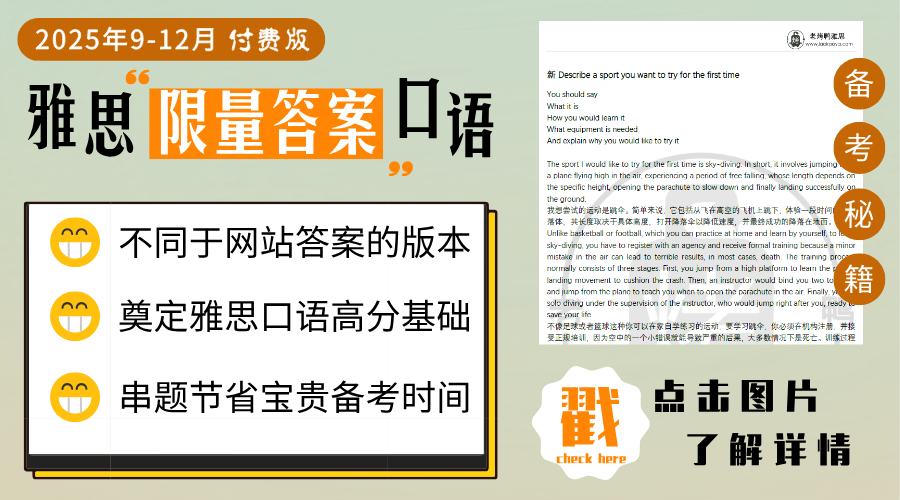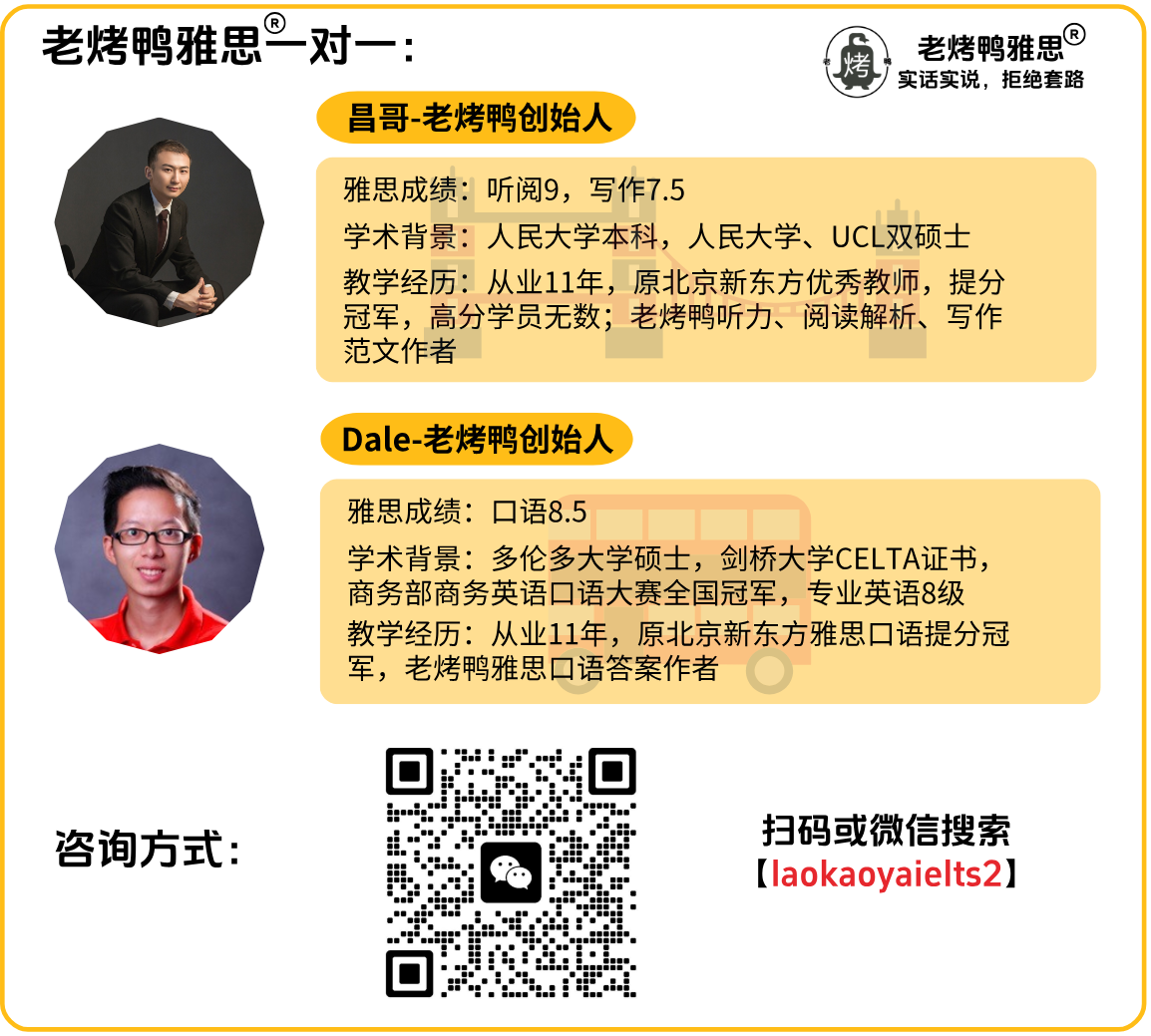剑桥雅思9Test1Section3听力原文与答案 course feedback
剑桥雅思9听力第一套题目第二部分的主题为课程反馈,内容包括对课堂讲演的感受,对课堂讨论的参与,对指导课的感觉,以及对如何更好理解课程的指导。整体来看,题目难度一般,甚至要比现在主流的雅思听力Section 3稍微简单一些。但因为两个学生都有口音,给听音辨音带来了一定的困难。
点击查看这篇雅思听力中需要大家掌握的重点词汇与具体题目的答案解析:
雅思备考听力篇 剑9 test 1 section 3 雅思听力高频词汇
剑桥雅思9Test1听力Section3答案解析 Course Feedback
剑9 test 1 Section 3雅思听力原文
TEACHER: Before we start, Spiros and Hiroko, thanks for coming in today to talk about your recent study experiences and congratulations to you both in doing so well in your first semester exams! I’d like to discuss with you the value of the English for Academic Purposes course you did here last year before starting your university course. Spiros, if I could start with you, what parts of the programme have now proved to be particularly valuable to you?
SPIROS: I think that having to do a seminar presentation really helped me. For example, a couple of weeks ago in our marketing subject, when it was my turn to give a presentation I felt quite confident. Of course, I was still nervous but because I had done one before, I knew what to expect. Also, I know I was well-prepared and I had practised my timing. In fact, I think that in relation to some of the other people in my group, I did quite a good job because my overall style was quite professional (Q21). What about you, Hiroko?
HIROKO: Mmm, that’s interesting. In my group, I was really surprised by the way the students did their presentations – they just read their notes aloud! Can you believe that? They didn’t worry about their presentation style or keeping eye contact with their audience (Q22) – and I remember that these things were really stressed to us in the course here.
TEACHER: So, how did you approach your presentation, Hiroko?
HIROKO: Well, to speak frankly, I read my notes too! At the time, it was a relief to do it this way, but actually, when I had finished, I didn’t feel any real sense of satisfaction (Q23). I didn’t feel positive about the experience at all.
SPIROS: That’s a pity. You know, although I was pleased with my presentation, I am not so pleased with my actual performance right now in the tutorials (Q24) – during the whole semester I’ve not said anything in our tutorial discussions. Not a word.
HIROKO: Really, Spiros? Why’s that? Do the other students talk too much?
SPIROS: It’s partly that, but it’s mostly because I have had no confidence to speak out. Their style of speaking is so different – it’s not the style we were used to during the course. They use so many colloquialisms, they’re not very polite and sometimes there seems to be no order in their discussion. Also, they are very familiar with each other, so because they know each other’s habits, they can let each other into the discussion (Q25).
HIROKO: You’re right, Spiros, I’ve experienced that too.
HIROKO: For most of this semester, I’ve said absolutely nothing in tutorials. But recently, I’ve been trying to speak up more and I just jump in (Q26), and I’ve noticed an interesting thing, I’ve noticed that if they thought my point was interesting or new, then the next time they actually asked for my opinion, and then it was much easier for me to be part of the discussion.
SPIROS: That’s great, Hiroko! I hope that happens for me next semester – I’ll have to work hard to find some interesting points. What helped you to find these ideas?
HIROKO: I think that one thing that helped me with this was the reading. I’ve had to do so much reading this semester just to help me make sense of the lectures. At first, I couldn’t understand what the lecturers were talking about, so I had to turn to the books and journals (Q27). Every night I read for hours, using the lists of references that were given, and I made pages of notes. At breakfast, I read and read my notes again. This habit has helped me to follow the ideas in the lectures, and it’s also given me some ideas to use in the tutorials.
SPIROS: But I did so much reading anyway – I don’t think there’s any time left over for anything extra. My reading speed is still quite slow (Q28), though I’m much better at dealing with vocabulary than I used to be.
TEACHER: What else do you think we could add to the course program to help with this reading problem?
SPIROS: There’s not really anything because it’s my problem. I remember we were given long articles to read. We didn’t like that but now I realise that reading those long articles was good preparation for the things I need to read now. Also, in class, we regularly had speed-reading tasks to do, and we kept a record of our reading speed, so the teachers were encouraging us to work on that.
HIROKO: That’s true Spiros, but what we read could have been different. Sometimes in the English class, I felt frustrated when I had to read articles about the environment or health or education, because I wanted to concentrate on my own field but we didn’t read anything about engineering (Q29). So, I think I wasted some time learning vocabulary I didn’t need.
TEACHER: But surely the strategies you were taught for dealing with that vocabulary were helpful.
HIROKO: Yes, but psychologically speaking, I would have felt much better working on reading from my own field (Q30). What do you think Spiros?
SPIROS: I agree; that would have helped my confidence too and I would have been more motivated. It was good though that we could work on our own topics when we wrote the research assignments.
TEACHER: Okay, let’s move on to writing now …
剑9 test 1 Section 3雅思听力答案
21. B
22. C
23. B
24. A
25. C
26. B
27. A
28. B
29. C
30. B





